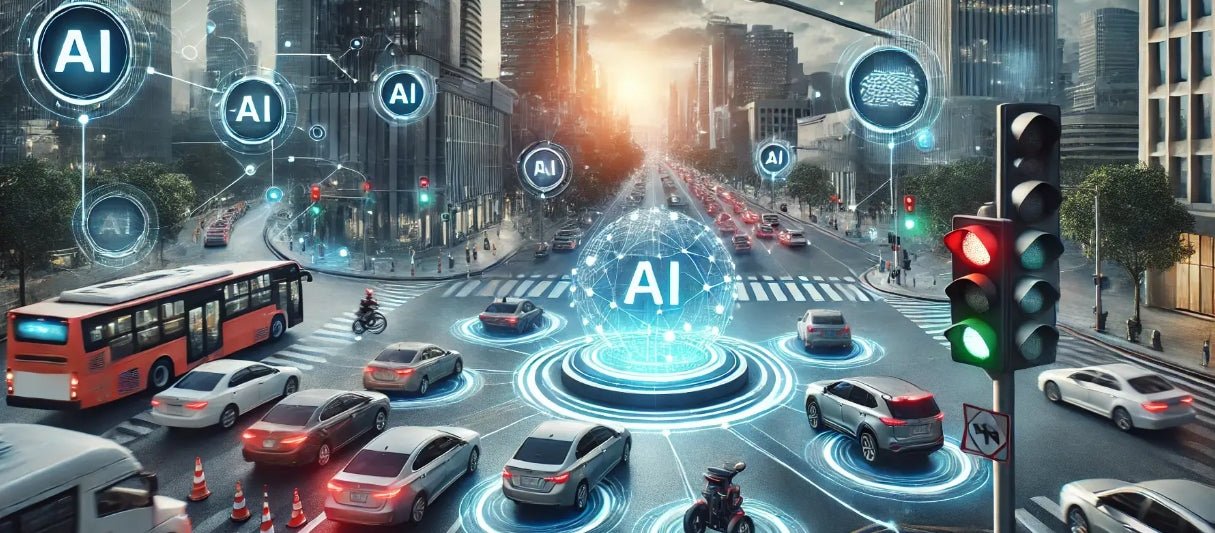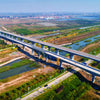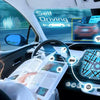TOF Networks in Smart Cities: Enhancing Safety and Spatial Awareness

The fourth industrial revolution, or Industry 4.0, is transforming traditional factories into intelligent, interconnected ecosystems. Central to this transformation is the integration of advanced sensing technologies that empower automation with precision, adaptability, and safety. Among them, TOF sensors (Time-of-Flight sensors) have emerged as a core component in enhancing industrial robot positioning, 3D ranging, and obstacle avoidance—laying the groundwork for next-generation smart manufacturing.
What Are TOF Sensors and Why Are They Crucial?
TOF sensors work by emitting infrared light pulses and measuring the time it takes for the light to bounce back from an object. This "time of flight" is then converted into accurate depth information, allowing machines to perceive their surroundings in three dimensions.
In modern smart factories, this technology enables:
-
Real-time 3D spatial awareness
-
Millimeter-level depth accuracy
-
Fast and low-latency feedback
-
Compact and energy-efficient design
These characteristics make TOF sensors ideal for industrial environments where high speed, reliability, and compact integration are essential.
Enhancing Industrial Robot Positioning
Precise positioning is the backbone of robotic automation. In assembly lines, robotic arms need to know the exact location, orientation, and dimensions of parts to operate effectively.
With TOF sensors:
-
Robotic arms can measure depth and object contours accurately
-
Robots can compensate for shifts in object placement or surface irregularities
-
Vision-guided robotics systems become more adaptive, reducing reliance on rigid programming
For example, a robot equipped with a TOF camera can detect the height of components on a conveyor belt in real-time, adjusting its path dynamically without halting the process—dramatically improving productivity.
Real-Time Obstacle Avoidance and Safety
In both stationary and mobile applications, obstacle avoidance is critical to prevent collisions and downtime.
-
Mobile robots (AGVs, AMRs) use TOF sensors to detect and map obstacles in their path, ensuring safe and efficient navigation
-
Collaborative robots (cobots) equipped with TOF technology can slow down or stop when a human enters their workspace, enabling safe human-machine collaboration
-
In dynamic environments, TOF sensors provide low-latency updates on spatial changes, allowing machines to react in milliseconds
Compared to ultrasonic sensors or simple bumpers, TOF provides 3D awareness—not just proximity—resulting in smarter, context-aware decision-making.
Accurate 3D Ranging for Smart Tasks
Beyond just avoiding obstacles, TOF sensors help robots measure, map, and interact with their environment more intelligently.
-
In quality control, TOF sensors detect surface defects or shape deviations
-
In warehouse automation, they help identify the size and volume of packages
-
In smart bin-picking, robots identify and extract items even in cluttered or overlapping scenarios
All these require reliable 3D ranging, which TOF delivers in real-time with minimal computational load.
TOF vs. Other Vision Technologies
| Technology | Depth Accuracy | Environmental Tolerance | Cost/Size | Real-Time Speed |
|---|---|---|---|---|
| RGB Cameras | No depth | Sensitive to lighting | Low | Fast |
| LiDAR | High | Affected by dust | High | Slower |
| TOF Sensors | Medium-High | Works in dust/smoke | Medium | Real-time |
TOF sensors offer a compelling balance between performance, cost, and flexibility—making them a practical choice for smart factories aiming to scale automation affordably.
Integration with AI and Sensor Fusion
The future of smart manufacturing lies in the fusion of TOF sensors with AI, edge computing, and other sensor modalities such as IMUs or thermal cameras. When combined:
-
Robots can not only see but also understand their environment
-
AI models can analyze 3D point cloud data for predictive maintenance
-
Multi-modal vision improves performance in diverse environments—indoors or outdoors, day or night
These smart systems enable autonomous adaptation, ensuring stable operation even under variable lighting, part variance, or dynamic tasks.
Real-World Use Cases in Smart Manufacturing
Smart Assembly Lines in Automotive Plants
TOF-equipped robots align chassis parts and inspect weld seams in real time, reducing inspection time and increasing production quality.
Electronics Manufacturing
Miniaturized TOF cameras help robots place microchips or connectors precisely on densely packed PCBs, enhancing yield and minimizing defects.
Warehouse Logistics and Sorting
AGVs and sorting robots use TOF-based navigation to maneuver safely, stack packages optimally, and avoid obstacles during high-speed operations.
Safety Compliance and Human-Robot Collaboration
In industries like food and pharmaceuticals, where humans and robots often share space, TOF ensures dynamic risk zones and keeps safety in check.
Looking Ahead: TOF in the Future of Industry 4.0
The next wave of TOF technology will feature:
-
Higher resolution sensors
-
Longer sensing ranges (up to 10 meters or more)
-
Edge AI capabilities directly on-chip
-
Seamless integration into digital twins and MES platforms
As factories become smarter and more autonomous, TOF sensors will evolve from simple distance tools into intelligent environmental interpreters—fueling a new era of predictive automation.
Conclusion
TOF sensors are no longer optional—they are essential for any forward-thinking smart manufacturing system. By improving industrial robot positioning, delivering real-time 3D ranging, and enabling safe obstacle avoidance, they empower businesses to automate with confidence.
In the ever-evolving landscape of Industry 4.0, TOF technology is not just enhancing performance—it is redefining what robots can perceive, process, and achieve.
Slamtec RPLIDAR A1 360° 12m LiDAR Sensor for Robot Navigation
After-sales Support:
Our professional technical team specializing in 3D camera ranging is ready to assist you at any time. Whether you encounter any issues with your TOF camera after purchase or need clarification on TOF technology, feel free to contact us anytime. We are committed to providing high-quality technical after-sales service and user experience, ensuring your peace of mind in both shopping and using our products.









